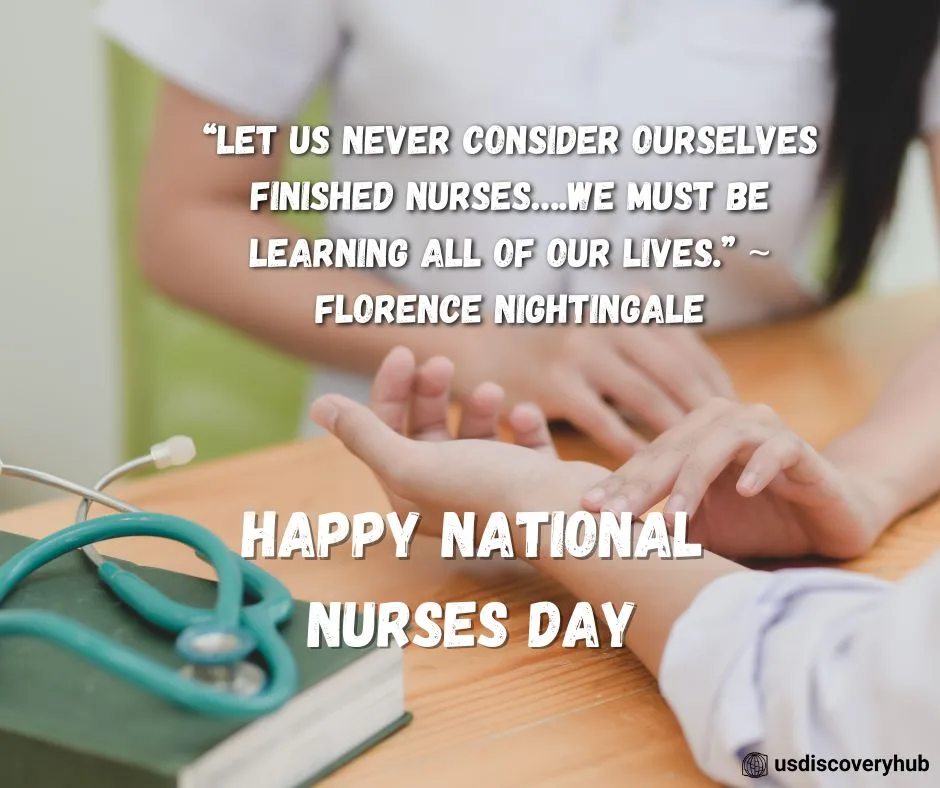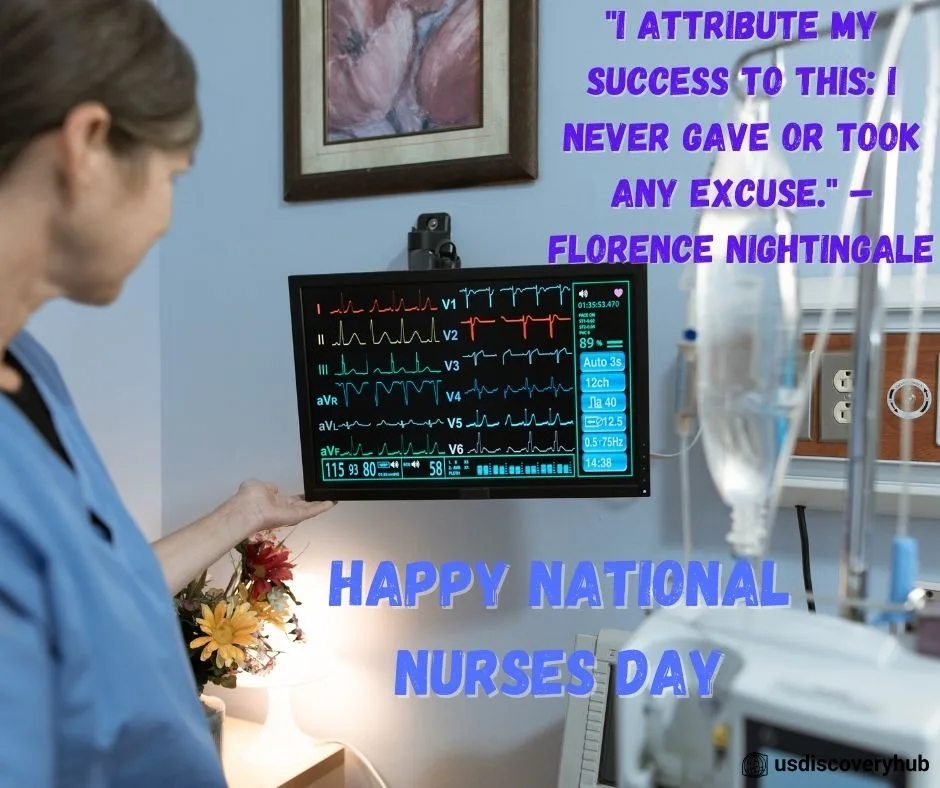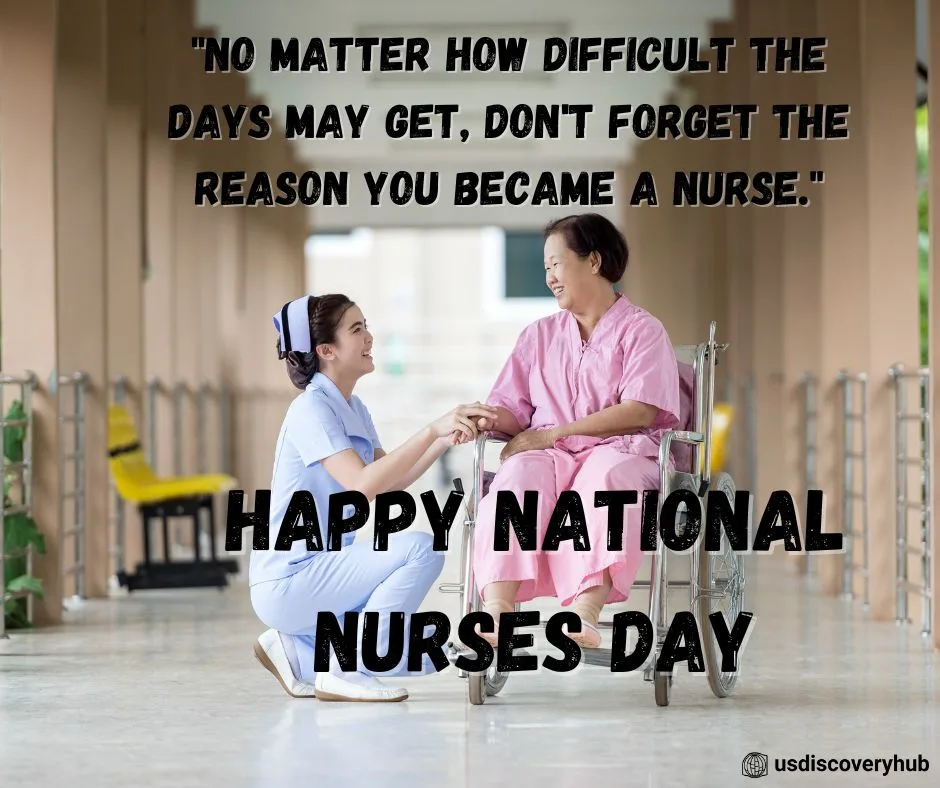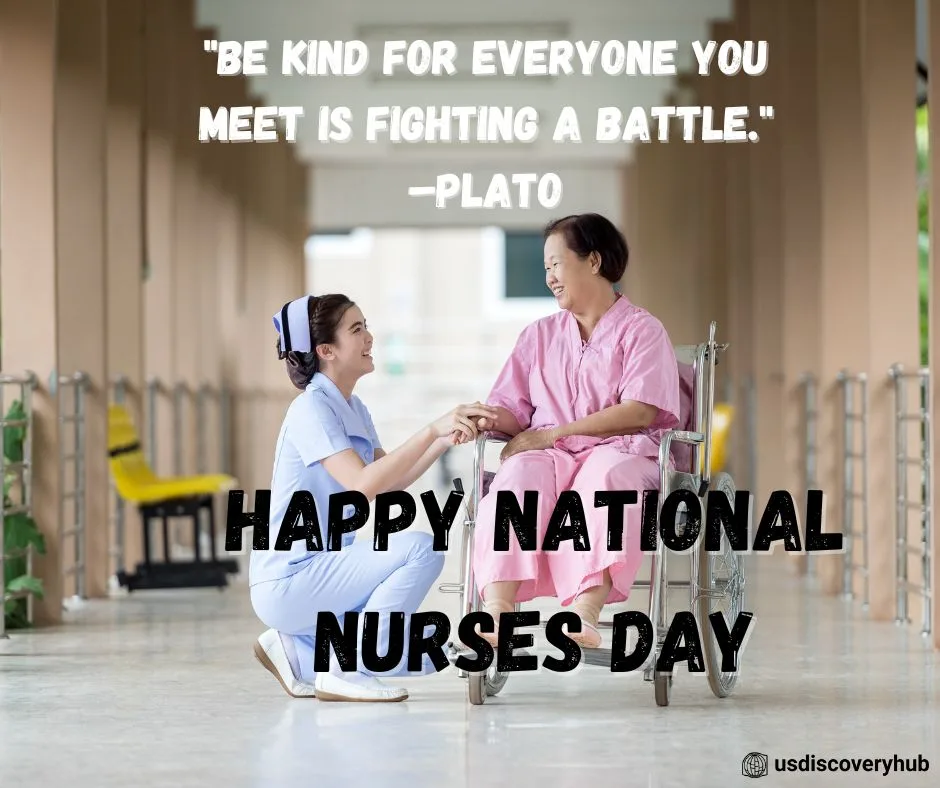The American Nurses Association established National Nurses Day on May 6th in 1990 to recognize and honor the contributions that nurses make to society. It coincides with the birthday of Florence Nightingale, who is considered the founder of modern nursing. National Nurses Day marks the first day of National Nurses Week, which runs from May 6th to May 12th. During this week, healthcare organizations and communities across the United States hold events and activities to celebrate and appreciate nurses for their hard work and dedication to promoting health and well-being.

The History of National Nurses Day
National Nurses Day was first observed in the United States on May 6, 1982. The day was established by the American Nurses Association (ANA) to honor and recognize the contributions of nurses to society. May 6th was chosen as the date for National Nurses Day because it is the birthday of Florence Nightingale, who is widely regarded as the founder of modern nursing.
In 1990, the ANA designated May 6th to May 12th as National Nurses Week. This extended celebration allows for more recognition and appreciation for the important work that nurses do.
Over the years, National Nurses Day and National Nurses Week have become widely recognized and celebrated across the United States. Hospitals, clinics, and other healthcare organizations often hold events and activities to recognize and honor their nurses during this time. The week also serves as an opportunity to raise awareness about the important role that nurses play in promoting health and well-being.
The United States, other countries also observe International Nurses Day on May 12th each year to coincide with Florence Nightingale, birthday. This day was first proposed by the International Council of Nurses in 1953 and has since been celebrated in countries all around the world.
How to celebrate International Nurses Day
International Nurses Day is celebrated annually on May 12th, which is the birthday of Florence Nightingale, the founder of modern nursing. Here are some ways you can celebrate International Nurses Day:
- Send a thank-you note or gift: You can show your appreciation for a nurse by sending them a thank-you note or gift. This could be something as simple as a handwritten note expressing your gratitude, or a small gift like a gift card, flowers, or chocolates.
- Share a story: Use social media to share stories about the impact that nurses have had on your life or the lives of others. Use the hashtag #InternationalNursesDay to join the global conversation.
- Donate to a nursing charity: Make a donation to a nursing charity or foundation that supports nurses, such as the American Nurses Foundation or the Florence Nightingale Foundation.
- Volunteer at a healthcare facility: If you have the time and skills, consider volunteering at a local healthcare facility to support nurses and patients.
- Attend a nursing event: Look for nursing events in your community, such as seminars or conferences, and attend to learn more about the nursing profession and show your support.
- Educate others: Take the opportunity to educate others about the important role that nurses play in healthcare and society.
- Write a thank you note: Write a personal note of appreciation to a nurse or nursing team, thanking them for their hard work, dedication, and compassion.
International Nurses Day is a day to celebrate and recognize the contributions of nurses around the world, and to raise awareness about the importance of the nursing profession.

Nurses Week gifts
- Gift cards for restaurants or online retailers
- Customized tote bags, coffee mugs, or water bottles with the nurse’s name or a special message
- Massage or spa treatments
- Flowers or plants
- Personalized thank-you notes or cards
- Gift baskets filled with snacks, treats, or pampering items
- Scrubs or other nursing accessories
- Continuing education opportunities or conference registrations
- Technology gadgets such as smartwatches, fitness trackers, or noise-cancelling headphones
- A paid day off or extra paid time off.
The Vital Role of Nurses
Nurses play a vital role in healthcare, providing patient care and support, advocating for patients’ needs, and helping to promote health and wellness. They are on the front lines of healthcare, working closely with patients and their families to deliver high-quality care and improve health outcomes.
One of the key roles of nurses is to provide direct patient care. They monitor patients’ vital signs, administer medications and treatments, and provide emotional support to patients and their families. Nurses also play a critical role in preventing the spread of infections, ensuring that patients receive appropriate nutrition and hydration, and assisting with mobility and other activities of daily living.
Nurses are also important advocates for their patients. They work to ensure that patients’ needs are met, that they receive appropriate care and treatments, and that they are treated with dignity and respect. Nurses also provide education and guidance to patients and their families, helping them to understand their conditions and make informed decisions about their healthcare.
their patient care responsibilities, nurses also contribute to healthcare by conducting research, participating in quality improvement initiatives, and serving in leadership roles within healthcare organizations. Nurses are also involved in public health initiatives, helping to promote health and prevent illness within their communities.
Nurses play a critical role in healthcare, providing essential patient care and support, advocating for patients’ needs, and contributing to efforts to improve health and wellness.
From COVID-19 to Mental Health
The COVID-19 pandemic has placed an unprecedented strain on healthcare systems and frontline workers, including nurses. Nurses have been on the front lines of the pandemic, caring for patients, administering vaccines, and providing emotional support to patients and their families.
National Nurses Day provides an opportunity to recognize the sacrifices and hard work of nurses during this challenging time. It is also a time to acknowledge the toll that the pandemic has taken on nurses’ mental health and well-being. Many nurses have experienced burnout, anxiety, and depression as a result of the pandemic, and National Nurses Day can help to raise awareness about the importance of mental health support for healthcare workers.
In addition to the pandemic, nurses play a critical role in promoting mental health and wellness in their patients. National Nurses Day can be an opportunity to highlight the important work that nurses do to support the mental health needs of their patients, including providing counseling, administering medications, and offering emotional support.
National Nurses Day serves as a reminder of the essential role that nurses play in promoting health and well-being, and the importance of supporting their mental health and well-being in return.

A Day in the Life of a Nurse
A day in the life of a nurse can be hectic, challenging, and rewarding all at once. Nurses work in a variety of settings, including hospitals, clinics, long-term care facilities, schools, and community health centers. Their daily tasks depend on their specialty area, but all nurses share the common goal of providing quality care to their patients. Here is a glimpse into what a typical day in the life of a nurse might look like:
6:30 AM – Arrive at work and receive report from the previous shift. Review patient charts, vital signs, and care plans for the day.
7:00 AM – Begin administering medications, checking vital signs, and performing assessments on patients. Some nurses may also start assisting with procedures or surgeries.
9:00 AM – Help patients with personal care, such as bathing, dressing, and toileting. Educate patients and families on their conditions, medications, and self-care techniques.
12:00 PM – Take a lunch break and use the time to recharge and catch up on charting.
1:00 PM – Attend rounds with the interdisciplinary team to discuss patient care plans and any changes in treatment. Collaborate with physicians, therapists, and other healthcare professionals to provide coordinated care.
3:00 PM – Administer medications, check vital signs, and perform assessments on patients again. Address any new concerns or changes in condition that may have arisen throughout the day.
5:00 PM – Start preparing patients for the evening shift, including administering medications and completing any necessary charting. Hand off report to the next shift and debrief with coworkers.
6:00 PM – End of the shift. Reflect on the day’s successes and challenges, and plan for tomorrow’s tasks.
While the above routine can vary depending on the nurse’s specialty area, workload, and work setting, one thing is constant: the nurse’s dedication to their patients’ health and well-being.
Recognizing Nurses’ Contributions
Recognizing nurses‘ contributions is an important aspect of National Nurses Day, as it is an opportunity to acknowledge the significant impact that nurses have on healthcare and the well-being of individuals and communities. Nurses are essential members of the healthcare team, and they play a crucial role in providing high-quality patient care, improving health outcomes, and promoting health and wellness.
Some ways in which nurses contribute to healthcare include:
- Patient care: Nurses are responsible for providing direct patient care, including administering medications, performing procedures, monitoring vital signs, and providing emotional support.
- Health promotion and education: Nurses work with patients and communities to promote health and prevent illness, providing education and resources to help people adopt healthy behaviors and make informed decisions about their health.
- Advocacy: Nurses are often advocates for their patients, ensuring that their voices are heard and their needs are met.
- Research: Nurses are involved in research projects aimed at improving healthcare delivery and outcomes.
- Leadership: Nurses are increasingly taking on leadership roles in healthcare, advocating for change and helping to shape the future of the profession.
Recognizing nurses’ contributions on National Nurses Day is a way to show gratitude for their hard work and dedication, and to inspire others to consider a career in nursing.
National Nurses Day Goes Virtual
As the COVID-19 pandemic continues to impact communities around the world, National Nurses Day has gone virtual in many places. Healthcare organizations and communities are finding creative ways to celebrate and honor nurses while maintaining social distancing guidelines.
Virtual events and activities include virtual award ceremonies, online webinars, and social media campaigns. Nurses are being recognized for their contributions with messages of gratitude and appreciation shared on social media platforms such as Twitter, Facebook, and Instagram.
Technology has also played a significant role in the virtual celebration of National Nurses Day. Many healthcare organizations are using telehealth technology to connect with patients and provide care remotely. This has allowed nurses to continue providing essential healthcare services while minimizing the risk of exposure to the virus.
Overall, the virtual celebration of National Nurses Day serves as a reminder of the vital role that nurses play in healthcare, especially during these challenging times. It also highlights the importance of leveraging technology to support and empower healthcare workers.

Empowering Nurses
Empowering nurses involves giving them the tools and resources they need to provide the best possible care for their patients. This can include providing opportunities for education and professional development, giving them a greater say in decision-making processes, and ensuring they have the support they need to manage the demands of their jobs.
One way to empower nurses is to provide them with more autonomy and decision-making power. This can involve giving nurses more control over their work schedules, allowing them to make decisions about patient care, and involving them in the development of policies and procedures. When nurses are empowered in this way, they are more likely to feel engaged and motivated in their work, which can lead to better outcomes for patients.
Another important aspect of empowering nurses is providing opportunities for education and professional development. This can include offering continuing education courses, encouraging nurses to pursue advanced degrees or certifications, and providing mentorship and leadership development programs. By investing in their education and professional growth, nurses can develop the skills and knowledge they need to provide high-quality care and advance their careers.
Finally, it is important to provide nurses with the support they need to manage the demands of their jobs. This can include offering resources for stress management, providing access to mental health services, and ensuring that nurses have the tools and resources they need to do their jobs safely and effectively. When nurses feel supported in this way, they are more likely to stay engaged and committed to their work, which can lead to better outcomes for both patients and healthcare organizations.
Celebrating Diversity in Nursing
Celebrating diversity in nursing is an important topic that highlights the contributions of nurses from different backgrounds and cultures. Nurses from diverse backgrounds bring unique perspectives, experiences, and insights to the nursing profession, which can help improve patient care and outcomes.
Nursing is one of the most diverse professions, with nurses representing a range of ethnicities, races, genders, sexual orientations, religions, and abilities. However, there is still work to be done to address systemic inequalities and ensure that all nurses have equal opportunities and support to succeed.
One way to celebrate diversity in nursing is by promoting cultural competency and sensitivity in nursing education and training. This can help nurses develop the skills and knowledge needed to provide culturally appropriate care to patients from diverse backgrounds. Healthcare organizations can also prioritize diversity and inclusion in their hiring practices and create supportive work environments that value and respect all nurses.
Another way to celebrate diversity in nursing is by recognizing and honoring the contributions of nurses from different backgrounds. This can be done through events, awards, and other initiatives that highlight the achievements of diverse nurses and promote their leadership and advancement in the profession.
Ultimately, celebrating diversity in nursing is about recognizing the strengths and contributions of all nurses, regardless of their background or identity, and creating a more inclusive and equitable profession that values and supports all nurses.
Thanking Nurses for Their Dedication
Nurses are essential to the healthcare system and play a crucial role in promoting health and well-being in our communities. They work tirelessly to care for patients, support families, and keep healthcare facilities running smoothly. National Nurses Day, which is observed annually on May 6th, is an opportunity to recognize and thank nurses for their dedication to the profession.
Nurses have been on the frontlines of the COVID-19 pandemic, putting themselves at risk to care for patients and keep our communities safe. They have worked long hours, often under challenging conditions, to provide essential care and support. Many have made personal sacrifices, such as being separated from their families and loved ones, to continue their work.
National Nurses Day is an opportunity to show gratitude and appreciation for nurses‘ hard work and sacrifices. There are many ways to thank nurses, such as sending a thank-you note, bringing them a small gift, or simply saying “thank you” in person or through social media. Healthcare organizations and communities can also organize events and activities to celebrate nurses and show their support.
It’s important to remember that thanking nurses is not just a one-day event. We should be grateful for their contributions to healthcare every day and work to ensure that they have the resources and support they need to continue their important work. By recognizing and thanking nurses for their dedication, we can help to promote a culture of appreciation and respect for the nursing profession.
National Nurses Day Quotes and Images





















National Nurses Day related Facts
Here are some interesting facts related to National Nurses Day:
- Florence Nightingale, who is celebrated on National Nurses Day, was the first woman to receive the Order of Merit, the highest civilian honor in the United Kingdom.
- Nursing is the largest healthcare profession in the United States, with over 4 million registered nurses (RNs) and licensed practical nurses (LPNs) employed in various healthcare settings.
- According to the Bureau of Labor Statistics, nursing is also one of the fastest-growing occupations in the country, with an expected job growth rate of 7% from 2019 to 2029.
- The first school of nursing in the United States was established in 1873 at Bellevue Hospital in New York City.
- During the Crimean War, Florence Nightingale and her team of nurses reduced the death rate among wounded soldiers from 42% to 2%.
- The first International Nurses Day was celebrated in 1965 on the 100th anniversary of Florence Nightingale’s arrival in Crimea.
- Nurses often work long hours and are on their feet for extended periods of time. On average, nurses walk 4 to 5 miles per shift.
- Nurses are known for their dedication to patient care, and many go above and beyond their duties to ensure their patients receive the best possible care. In fact, a survey conducted by the ANA found that 94% of Americans believe that nurses are honest and ethical.
- In 2020, the World Health Organization designated 2020 as the Year of the Nurse and Midwife in honor of Florence Nightingale’s 200th birthday.
- National Nurses Day is not just celebrated in the United States. Many countries around the world also have their own days to honor nurses and the nursing profession.
National Nurses Day related FAQs
What day is nurses Appreciation day?
National Nurses Appreciation Day is observed on May 6th in the United States, which is also known as National Nurses Day. This day marks the beginning of National Nurses Week, which is celebrated from May 6th to May 12th. During this time, healthcare organizations and communities across the country honor and recognize nurses for their hard work, dedication, and contributions to society.
How do we celebrate National Nurses Day?
National Nurses Day is celebrated annually on May 6th to honor the contributions of nurses. Ways to celebrate include sending thank-you notes or gifts, organizing community events, sharing stories and photos on social media, volunteering at healthcare facilities, and donating to nursing organizations. National Nurses Week is celebrated from May 6th to May 12th.
Why do we celebrate nurses?
Nurses are celebrated for their vital role in promoting health and wellness, providing essential care and support, and their compassion and dedication to patients.
Who is the day mother of nursing?
Florence Nightingale is known as the “mother of modern nursing” due to her contributions to the profession. She established standards for hygiene and cleanliness, emphasized the importance of nursing education and training, and her legacy continues to have a significant impact on the nursing profession.
What is the definition of nursing?
Nursing is a healthcare profession focused on providing care for individuals, families, and communities to promote health and prevent illness. Nurses work in a variety of settings, including hospitals, clinics, schools, nursing homes, and private homes. They are responsible for a range of tasks, such as administering medications, monitoring vital signs, providing emotional support to patients and families, and educating patients about their health and wellness. The nursing profession is based on a set of core values, including compassion, professionalism, respect for human dignity, and a commitment to lifelong learning and personal growth.
Why was May 6th chosen as National Nurses Day?
May 6th was chosen as National Nurses Day because it is the birthday of Florence Nightingale, who is known as the founder of modern nursing. She was a British nurse who became famous for her work during the Crimean War in the 1850s, and she is widely considered to be the founder of the modern nursing profession.